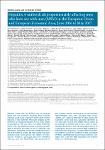Hepatitis A outbreak disproportionately affecting men who have sex with men (MSM) in the European Union and European Economic Area, June 2016 to May 2017
Ndumbi, Patricia
Freidl, Gudrun S.
Williams, Christopher J.
Mårdh, Otilia
Varela, Carmen
Avellón, Ana
Friesema, Ingrid
Vennema, Harry
Beebeejaun, Kazim
Ngui, Siew Lin
Edelstein, Michael
Smith-Palmer, Alison
Murphy, Niamh
Dean, Jonathan
Faber, Mirko
Wenzel, Jürgen
Kontio, Mia
Müller, Luise
Midgley, Sofie Elisabeth
Sundqvist, Lena
Lundberg Ederth, Josefine
Roque-Afonso, Anne-Marie
Couturier, Elisabeth
Klamer, Sofieke
Rebolledo, Javiera
Suin, Vanessa
Aberle, Stephan W.
Schmid, Daniela
De Sousa, Rita
Figueiredo Augusto, Gonçalo
Alfonsi, Valeria
Del Manso, Martina
Ciccaglione, Anna Rita
Mellou, Kassiani
Hadjichristodoulou, Christos
Between 1 June 2016 and 31 May 2017, 17 European Union (EU) and European Economic Area countries reported 4,096 cases associated with a multi-country hepatitis A (HA) outbreak. Molecular analysis identified three co-circulating hepatitis A virus (HAV) strains of genotype IA: VRD_521_2016, V16–25801 and RIVM-HAV16–090. We categorised cases as confirmed, probable or possible, according to the EU outbreak case definitions. Confirmed cases were infected with one of the three outbreak strains. We investigated case characteristics and strain-specific risk factors for transmission. A total of 1,400 (34%) cases were confirmed; VRD_521_2016 and RIVM-HAV16–090 accounted for 92% of these. Among confirmed cases with available epidemiological data, 92% (361/393) were unvaccinated, 43% (83/195) travelled to Spain during the incubation period and 84% (565/676) identified as men who have sex with men (MSM). Results depict an HA outbreak of multiple HAV strains, within a cross-European population, that was particularly driven by transmission between non-immune MSM engaging in high-risk sexual behaviour. The most effective preventive measure to curb this outbreak is HAV vaccination of MSM, supplemented by primary prevention campaigns that target the MSM population and promote protective sexual behaviour.

